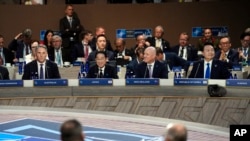NATO set out Thursday to deepen relations with key Indo-Pacific partners, meeting with leaders from Australia, Japan, New Zealand and South Korea a day after all 32 NATO allies called out China for its support of Russia's illegal war against Ukraine in a sternly worded communique.
During a working session, NATO and its Indo-Pacific partners strengthened plans and developed strategies to face growing threats in the Pacific region, including North Korean missile launches and China's steady stream of technology and raw materials to Russia that have allowed President Vladimir Putin to replace his losses on the battlefield.
U.S. officials said the Indo-Pacific partners' attendance sent a message to China that democratic alliances will stand up for the rule of law, no matter where an aggressor tries to break it.
"NATO also recognizes that threats from the Indo-Pacific, whether it's the DPRK [North Korea] or the PRC [China] supporting Russia in their aggression against Ukraine, we cannot avoid," Jason Israel, National Security Council senior director for defense policy, Israel told VOA.
In a final communique signed by all 32 allies, NATO called China a "decisive enabler" of Russia's war and urged Beijing to cease its support.
"The PRC cannot enable the largest war in Europe in recent history without this negatively impacting its interests and reputation," the leaders wrote.
They also expressed concerns about Beijing's space capabilities and nuclear arsenal.
NATO Secretary-General Jens Stoltenberg on Wednesday told reporters that "China is propping up Russia's war economy" and "increas[ing] the threat Russia holds to Europe and NATO security."
"China provides dual-use equipment, microelectronics and a lot of other tools which are enabling Russia to build the missiles, to build bombs, to build the aircraft, to build the weapons they're using to attack Ukraine," he added.
Asked by VOA whether the statement was a strong enough message to deter China from continuing to support Russia, Stoltenberg replied in the news conference that Wednesday's declaration was "the strongest message that NATO allies have ever sent on China's contributions to Russia's illegal war against Ukraine."
Some allies on Thursday cautioned the alliance against using the narrowly worded communique as a springboard to make NATO appear "anti-China."
"NATO is a defense alliance. ... We can't organize it into an anti-China bloc," Hungarian Foreign Minister Peter Szijjarto told Hungarian state television on the sidelines of the summit.
However, defense expert Bradley Bowman, the senior director for the Foundation for Defense of Democracies' Center on Military and Political Power, said calling out China was long overdue for the bloc.
"Europeans are dying in Europe in a war of aggression from the Kremlin with the support of Iran, North Korea and China, period," he said.
U.S. President Joe Biden on Wednesday said NATO must counter Russia's ramping up of defense production — made possible by help from China, North Korea and Iran — by continuing to invest more in Ukraine's and NATO's own defense production.
"We cannot allow the alliance to fall behind," Biden said.
China insists that it does not provide military aid to Russia, despite maintaining strong trade ties with Moscow.
On Monday, Chinese Foreign Ministry spokesperson Lin Jian accused NATO of "breaching its boundary, expanding its mandate, reaching beyond its defense zone and stoking confrontation."




